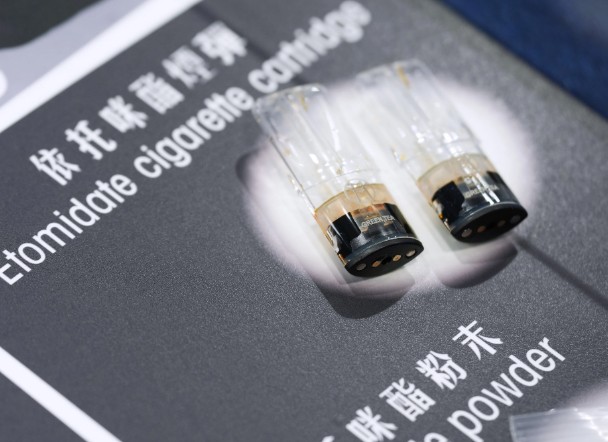Your support powers our stories
During a Legislative Council Panel on Security meeting on Monday, lawmakers discussed the growing use of space oil among Hong Kong youth and the government’s efforts to curb its consumption. Space oil, a drug consumed through e-cigarettes, gained popularity due to its affordability and rapid effects. However, it was banned last month following the inclusion of its key component, etomidate, in the Dangerous Drugs Ordinance, classifying it alongside substances such as ketamine and cocaine. Lawmaker Chow Man-kong highlighted concerns about young people acquiring the drug through social media platforms and suggested incentivizing students to report sellers as a potentially more effective strategy than traditional anti-drug advertisements.
Government officials weighed in on various approaches to enforcement and prevention. Commissioner for Narcotics Kesson Lee clarified that there were no plans to introduce a formal reporting mechanism but emphasized that authorities welcomed public tip-offs on illegal activities. Lawmaker Dominic Lee suggested that the government’s anti-space oil campaigns lacked a public figure to drive awareness and proposed engaging a Key Opinion Leader (KOL) to enhance outreach. Meanwhile, lawmaker Edmund Wong questioned whether authorities would consider installing “disposal boxes” to allow individuals to surrender space oil anonymously, similar to the approach taken when banning cannabidiol (CBD) in 2022. However, Lee dismissed the idea, stating that space oil’s classification as a drug made it fundamentally different from CBD.
Since the ban’s implementation, law enforcement has intensified efforts to crack down on space oil-related offenses. Police reported making 39 arrests in the first two weeks, with cases ranging from possession to suspected trafficking and manufacturing. Additionally, authorities have uncovered three space oil production facilities, underscoring concerns about its availability. The penalties for space oil-related offenses are now significantly stricter, with possession carrying up to seven years in prison and trafficking punishable by life imprisonment. As the government continues to combat the issue, discussions surrounding enforcement strategies and public awareness efforts remain ongoing.
“Your donation helps us cover global events, ensuring everyone stays informed.”
(Source: SCMP | HKFP)









